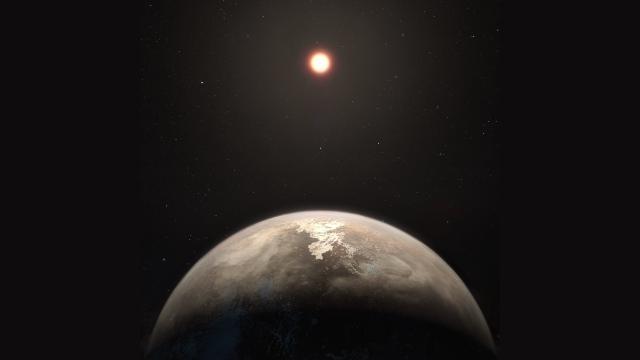When scientists discovered an Earth-like planet orbiting our closest star, Proxima Centauri b, Gizmodo said it could have been the discovery of the century. But today, scientists are announcing a new exoplanet only 11 light years away that could be even more important.
Image: ESO/M. Kornmesser
A team of European scientists named their planet Ross 128 b after the star it orbits, Ross 128. It has a projected mass 1.35 times Earth’s and might even have comfortable surface temperatures. Scientists won’t call it habitable just yet, but the observation is promising.
“It’s more exciting than Proxima Centauri b,” Emily Rice, research associate in astrophysics at the American Museum of Natural History told Gizmodo. “The star is quieter and less active… it will be easier to characterise than Proxima b.”
The researchers took 157 observations of Ross 128 with the HARPS spectrograph, or as the European Southern Observatory calls it, “the planet hunter of ground-based astronomy” in the Chilean desert. The planet doesn’t transit, or pass in front of its star from our point of view, so HARPS must instead measure velocities based on the spectrum of observed light. This time around, the instrument detected the planet with an orbit of 9.9 days, around 20 times closer to its star than the Earth is to the Sun.
There are a lot of reasons to have hope about Ross 128 b. The less-active Ross 128 star could make Ross 128 b easier to study than Proxima Centauri b. The planet may be as cold as -60C, but it might be as nice as 20.5C depending on assumptions of how much light it reflects. The broad temperature spread means that scientists won’t call it a “habitable” planet just yet. “It is probably preferable to refer to Ross 128 b as a temperate planet,” the study’s authors write in the study published today in Astronomy & Astrophysics.
Other researchers found the observations convincing. “The results are credible and exciting,” Avi Loeb, chair of the Harvard Astronomy Department, told Gizmodo in an email. “I see no reason to doubt it,” Guillem Anglada-Escude, one of the Proxima Centauri b discoverers from Queen Mary University of London, told Gizmodo in an email. But everyone I spoke to pointed out that only one instrument, HARPS, has made the observation. “It would be good to have independent confirmation with something else,” said Anglada-Escude. “We are already working on this.” The new paper’s authors did not respond to a Gizmodo request for comment.
Perhaps most exciting is the reminder that these teeny M dwarf stars such as Proxima Centauri, Ross 128 and TRAPPIST-1 could be ideal places to spot Earth-like planets, rather than stars like the Sun. Ross 128 is only 17 per cent the Sun’s mass and 20 per cent its radius. And there’s a whole lot of potential for observing these stars. “They’re literally all over the place,” said Rice. “It’s so much parameter space that we haven’t explored, like the size of these stars and the size of these planets. You don’t just want one. You want a bunch of them to figure out the general properties of these things.
Further observations will better characterise these planets’ potential atmospheres. Observations with the new James Webb Space Telescope will probably be “prohibitively expensive”, though other telescopes such as the Very Large Telescopes may be able to take on the job.
You may have also heard of the Yuri Milner Breakthrough Initiative to develop a craft to visit Alpha Centauri. Rice wondered why we don’t just visit Ross 128 and its planet instead. “If we get the technology to send something at 10 (or 20) per cent the speed of light, it’s not that much more of an investment to send something three times further away,” she said. “They’re already doing something wacky, why not try something three times wackier.”
